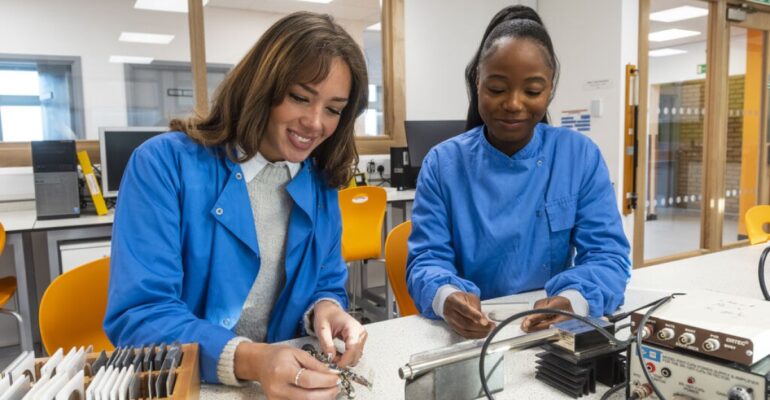Study Physics in UK: Top Universities, Courses, Costs & Career Guide
Physics is one of the most fascinating subjects for students who want to understand how the universe works. From exploring the smallest particles to discovering the mysteries of black holes, physics opens up endless opportunities for curious minds. Choosing to study physics in UK gives international students the chance to learn from world-class universities, advanced laboratories, and leading researchers in the field. With a long history of scientific breakthroughs, the UK remains one of the top destinations in the world for students keen to pursue higher education in physics.
Benefits of studying physics in UK
There are many benefits to choosing the UK for your physics degree. Some of the key advantages include:
- World-class teaching: UK universities are globally respected for their teaching quality and advanced research methods.
- Diverse specialisations: Students can explore different branches of physics such as nuclear physics, astrophysics, medical physics, and quantum mechanics.
- Modern facilities: Universities in the UK invest heavily in laboratories, simulations, and research centres to give students practical learning experiences.
- Global recognition: A UK degree is widely recognised and holds value worldwide, increasing career prospects in international markets.
Top universities and colleges offering physics in UK
The UK is home to some of the most prestigious universities for physics. Notable institutions include:
- University of Oxford – Known for its deep focus on research and innovation in theoretical physics.
- University of Cambridge – A hub for cutting-edge projects in nuclear, particle, and astrophysics.
- Imperial College London – Famous for its applied sciences and research-intensive physics degrees.
- University of Edinburgh – Specialises in cosmology, quantum physics, and space research.
- University of Birmingham – Offers both undergraduate and postgraduate opportunities, along with strong emphasis on employability.
Popular courses in physics
Students who study physics in UK can choose from a wide variety of courses depending on their academic level:
- BSc Physics – A three-year bachelor’s programme covering core areas such as mechanics, electromagnetism, thermodynamics, and quantum principles.
- MPhys (Integrated Master’s Programme) – A four-year option that combines undergraduate and postgraduate learning with a focus on research.
- Astrophysics – Specialised courses focusing on galaxies, stars, and black holes.
- Medical Physics – A growing branch that applies physics to healthcare technologies.
- Nuclear and Particle Physics – Designed for those who want to explore atomic structures and subatomic particles.
Admission requirements for international students
Admission to physics programmes in the UK will depend on the level of study:
- Undergraduate: Students usually need A-levels (or equivalent) in Physics and Mathematics. Pakistani students may need a foundation year depending on their high school qualifications.
- Postgraduate (Master’s): A recognised undergraduate degree in physics or a related subject is typically required.
- English Language Proficiency: IELTS, TOEFL or PTE is required, with minimum band scores depending on the university.
- Documentation: Statement of Purpose (SOP), recommendation letters, academic transcripts, and sometimes an interview.
Cost of studying physics in UK
The cost of tuition and living will depend on the university and location, but here are average estimates:
- Tuition Fees: £18,000 to £28,000 per year for international students.
- Living Expenses: About £1,000–£1,500 per month, depending on the city. London is more expensive, while cities like Birmingham, Manchester, or Glasgow are relatively affordable.
Scholarships and financial aid are available for deserving international students, which can reduce the cost significantly.
Career opportunities after studying physics in UK
Graduates who study physics in UK find themselves in high demand across various industries. Some career paths include:
- Research scientist in universities or laboratories.
- Jobs in aerospace, defence, and engineering.
- Roles in finance, data science, and technology as employers value problem-solving and analytical skills.
- Medical physics and healthcare research.
- Academic teaching or pursuing further studies like PhDs.
Visa process and work opportunities for international students
To study physics in UK, international students typically apply for a Student Visa (formerly Tier 4). Requirements include:
- Proof of admission offer from a UK university.
- Confirmation of Acceptance for Studies (CAS) letter from the institution.
- Evidence of sufficient financial support (tuition + living costs).
- English language test results (where required).
Once in the UK, students are usually allowed to work up to 20 hours per week during academic terms and full-time during holidays. After graduation, students can apply for a Graduate Route Visa that allows up to 2 years to work in the UK, extending valuable opportunities to gain international experience.
Tips for international students in physics programs
- Start applications early: Universities in the UK are competitive, so applying ahead of deadlines increases chances of success.
- Balance academics with social life: Join student societies and networks to adapt to a new culture.
- Seek scholarships: Many universities offer part-funding for physics students.
- Stay career-focused: Gain experience through internships and research projects.
- Master time management: Physics can be intensive, so staying organised is crucial.
Conclusion
Choosing to study physics in UK is an excellent decision for students who are passionate about science and innovation. With access to some of the best universities, diverse courses, advanced laboratories, and bright career prospects, the UK provides both the knowledge and opportunities needed for a successful future.
Start your study abroad journey with MR Consultants today. As official partners of top UK universities including the University of Birmingham and University of Nottingham, we provide expert guidance in admissions, scholarships, and visa applications. Contact MR Consultants for a free consultation and let us help you make your dream of studying in the UK a reality.






